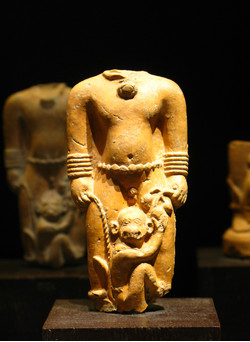Artwork Search
Arts in Southeast Asia Database
A clay offering doll depicting a human leading a monkey.
Keywords : U-thong National Museum, A clay offering doll depicting a human leading a monkey, an offering doll, A clay doll
| Site common name | The National Museum U-Thong |
|---|---|
| Type of artwork | Sculpture |
| Sub district | U Thong |
| District | U Thong |
| Province | Suphan Buri |
| Region | Central |
| Country | Thailand |
| Geographic Coordinates DMS | Lat : 14.373126 Long : 99.891406 |
| Geographic Coordinates UTM | Zone : 47 P Hemisphere : N E : 596139.84 N : 1589166.81 |
| Place of artwork | In the exhibition hall |
| History of production | The construction history remains unclear. |
|---|---|
| Production process | The construction history remains unclear. |
| Art | A small clay doll without the head. It depicts a naked man wearing necklace, belt and a bracelet. The right hand holds a chain that ties the monkey who sits between the two legs and the left hand holds fruit. |
| Key academic information | A clay offering doll depicting a human leading a monkey is a distinctive feature of Dvaravati culture. It reflects the local beliefs. It is commonly found in the ancient Dvaravati cities on central Thailand. |
| Notice | It is a local belief without clear details. Some scholars think that it was created as an offering doll to worship supernatural power. Other scholars think that it is related to Buddhism belief. The monkey is compare to a busy mind that has to be chained. |
| Period | Historical Period |
| Art period | Dvaravati |
| Age | 12th -16th centuries BE. |
| Religion and belief | Respect or worship nature |
| Type of License | Attribution-NonCommercial-NoDerivs (CC BY-NC-ND) |
|---|---|
| Rights | Princess Maha Chakri Sirindhorn Anthropology Centre |
| Date of record creation | 2016-08-19 |
| Record creator | Rungroj Thamrungraeng |
| Bibliography | ผาสุข อินทราวุธ, ทวารวดี การศึกษาเชิงวิเคราะห์จากหลักฐานทางโบราณคดี. กรุงเทพฯ : อักษรสมัย, 2542. ศักดิ์ชัย สายสิงห์, ศิลปะทวารวดี วัฒนธรรมพุทธศาสนายุคแรกเริ่มในดินแดนไทย. กรุงเทพฯ : เมืองโบราณ, 2547. พนมบุตร จันทรโชติ และคณะ, นำชมพิพิธภัณฑสถานแห่งชาติอู่ทอง และเรื่องราวสุวรรณภูมิ. กรุงเทพฯ : กรมศิลปากร, 2550. |


